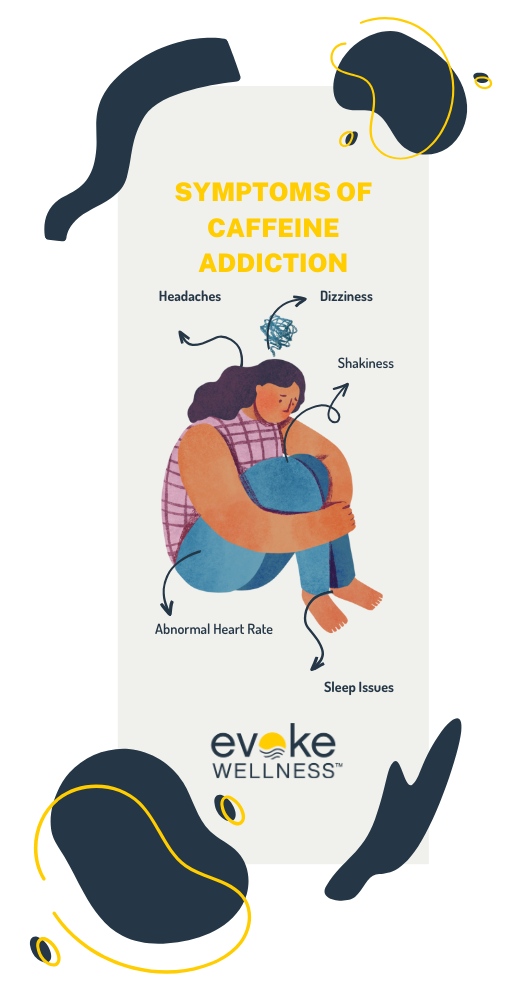In today’s fast-paced world, caffeine has become a ubiquitous crutch that many of us lean on to get through long days. But an over-reliance on caffeine can quickly snowball into a harmful addiction. If you find yourself unable to start your day without a triple shot latte or regularly drinking multiple energy drinks, it may be time to re-evaluate your relationship with caffeine. This article will walk you through a twelve step program designed to help you gradually cut back on caffeine intake. With commitment and perseverance, you can kick your caffeine addiction to the curb. The journey starts with admitting you have a problem and making the decision to change.
What Is Caffeine Addiction?
Caffeine addiction refers to excessive and harmful long-term use of caffeinated beverages like coffee and energy drinks that disrupts daily life. Around 8% of regular caffeine users meet the criteria for Caffeine Use Disorder according to studies. It takes anywhere from a few days to years of regular caffeine intake to develop an addiction.
Contributing Factors
Caffeine addiction is caused by factors like genetics, developing tolerance over time, and using it to relieve withdrawal symptoms like tiredness. The brain’s reward system is affected, triggering dopamine release and creating a cycle that reinforces continued consumption.
Symptoms & Effects
Common symptoms include dizziness, shakiness, headaches, increased blood pressure, nervousness, abnormal heart rate, and sleep issues. These interfere with daily activities. Withdrawal results in headaches, fatigue, reduced alertness and slower reaction times, typically starting 12-24 hours after the last dose.
Individuals may be unable to limit intake, experience distress when unable to consume caffeine, and continue use despite negative consequences. While some debate if it qualifies as an actual addiction, withdrawal is a recognized medical condition.
How Addiction to Caffeine Develops
Brain Chemistry Changes
Through regular consumption, caffeine alters the brain’s adenosine receptors, creating dependence. Caffeine fits into these receptors, blocking feelings of tiredness. The brain compensates by growing more receptors to maintain equilibrium. More caffeine is then needed to achieve the same effects, leading to increased use.
Withdrawal Symptoms
Abruptly stopping regular caffeine intake causes withdrawal symptoms like headaches, fatigue and irritability. This results from changes in brain chemistry: without caffeine blocking the surplus adenosine receptors, the effects of adenosine are exaggerated. Withdrawal drives continued caffeine use to relieve these aversive symptoms.
Reward and Reinforcement
Caffeine indirectly stimulates dopamine release, the brain’s “reward” neurotransmitter. This pleasurable feeling reinforces future caffeine use. Habitual caffeine consumers experience enhanced positive subjective effects, likely from relieving withdrawal. Conditioned preferences for caffeinated flavors further motivate consumption.
Signs You May Be Addicted to Caffeine
Withdrawal Symptoms
Do you experience headaches, irritability, fatigue, or difficulty concentrating when you cut back on caffeine? These are common withdrawal symptoms that typically begin 12-24 hours after your last caffeine intake and peak around 20-51 hours later. Feeling like you “have to have” caffeine in the morning is another red flag.
Increasing Tolerance
Over time, your body can build up a tolerance to caffeine. This means you need to consume higher doses to experience the same energizing effects as before. Regularly consuming high daily amounts of caffeine (750-1200mg or more) is a strong indicator of potential addiction.
Failed Attempts to Quit
Have you tried and failed to cut down or stop consuming caffeine, despite knowing about negative impacts like heart issues, stomach problems, or urinary troubles? In one US study, 56% of caffeine users endorsed having a persistent desire or unsuccessful efforts to control their intake – the most common sign of dependence.
Functional Impairment
Severe caffeine withdrawal can cause problems at work, school or in relationships. Research shows 73% of dependent users reported issues like missing obligations during acute withdrawal phases. An inability to quit or reduce intake despite health motivations is a clear signal of addiction.
Health Consequences of Caffeine Addiction
Physiological Effects
Persistent caffeine addiction can lead to numerous adverse physiological effects. Studies have linked excessive caffeine consumption to increased risks of anxiety, insomnia, hypertension, cardiac arrhythmias, and reduced fetal growth during pregnancy. In some cases, up to 14% of the general population reported continued caffeine use despite awareness of recurring physical or psychological issues likely caused by caffeine. This continued use despite harm ranged from 7-87% across different populations, with treatment-seeking caffeine-dependent individuals exhibiting the highest rates.
Withdrawal Symptoms
Abruptly discontinuing chronic caffeine use can trigger a defined withdrawal syndrome characterized by headaches, fatigue, irritability, and difficulty concentrating. Severe withdrawal can impair daily functioning, with clinically significant symptoms affecting 10-55% of individuals in experimental studies and higher rates among dependent populations. Pregnant women diagnosed with lifetime caffeine dependence were less likely to quit, potentially exposing the fetus to adverse birth outcomes due to high caffeine exposure.
Cardiovascular Risks
Excessive caffeine intake has been associated with an increased risk of hypertension and cardiac issues like arrhythmia. In some cases, caffeine overdose can lead to irregular heartbeats, breathing difficulties, and even potential heart failure, necessitating immediate medical attention. The FDA cites 400mg per day as a generally safe caffeine limit for adults, but symptoms like insomnia, anxiety, and nausea may indicate overconsumption beyond an individual’s tolerance level.
How to Break the Caffeine Addiction
Gradually Taper Caffeine Intake
Quitting caffeine cold turkey can lead to severe withdrawal symptoms like headaches, fatigue, irritability and difficulty concentrating. The safest approach is to gradually taper your daily caffeine intake over 2-3 weeks to minimize these effects. Start by reducing your intake by 25% each week until you reach zero. Drink decaf coffee or tea as a substitute.
Find Caffeine-Free Alternatives
As you reduce your caffeine consumption, it’s important to find satisfying alternatives that can replace your coffee or energy drink habit. Herbal teas like rooibos or turmeric ginger infusions make excellent caffeine-free options. You can also try small amounts of green tea which contains less caffeine than coffee.
Manage Withdrawal Symptoms
Withdrawal symptoms peak within 1-4 days and may include headaches, fatigue, irritability and difficulty concentrating. Stay hydrated, get extra rest, and consider over-the-counter pain medication to ease headaches. Adopt new energy-boosting habits like exercise, power naps and healthy snacks.
Seek Support if Needed
If you find yourself struggling with severe or prolonged withdrawal symptoms, don’t hesitate to seek professional medical support. A doctor can provide medications to relieve symptoms and guide you through tapering your caffeine safely under supervision. Joining a support group can also provide encouragement and accountability.
Suffering from other addictions
In addition to caffeine dependence, many individuals grapple with co-occurring substance use disorders or mental health conditions. According to the national helpline, over 800,000 calls are received annually seeking guidance on addictions treatment.
Comprehensive support
Seeking help through specialized treatment programs offers a comprehensive approach to address multiple challenges simultaneously. These evidence-based interventions cater to the unique needs of each person, providing:
- Personalized counseling and therapy
- Medication management if required
- Relapse prevention strategies
- Access to peer support groups
Holistic recovery pathways
A key aspect is adopting a holistic mindset that promotes overall well-being. This involves exploring various avenues such as:
- Developing healthy coping mechanisms
- Building a robust support network
- Incorporating mindfulness practices
- Pursuing meaningful activities and hobbies
The road to recovery is an ongoing journey. However, seeking professional guidance can empower individuals to break free from the vicious cycle of addictions, paving the way for a fulfilling, addiction-free life.

FAQ: How Can an Anxiety Treatment Program Help With Caffeine Addiction?
Managing Withdrawal Symptoms
An anxiety treatment program can teach coping strategies like relaxation and mindfulness to manage caffeine withdrawal symptoms such as headaches, fatigue, and mood changes. These techniques make reducing caffeine intake easier by mitigating unpleasant side effects.
Improving Sleep Hygiene
Poor sleep quality can worsen anxiety and make caffeine withdrawal more challenging. Anxiety programs emphasize sleep hygiene practices like maintaining a regular schedule and creating a restful environment to promote better rest when cutting back on caffeine.
Addressing Underlying Issues
Caffeine dependence is linked to increased substance use and may exacerbate pre-existing mental health conditions like anxiety disorders. Comprehensive treatment addresses the root causes through therapy, allowing individuals to break patterns of compensatory caffeine use.
Promoting Wellness
Reducing caffeine’s anxiogenic effects is crucial for an accurate anxiety diagnosis and effective medication management. An anxiety program’s holistic approach, including exercise and nutrition guidance, supports overall well-being during caffeine cessation.
Conclusion
Ultimately, overcoming caffeine addiction requires determination, perseverance, and a strong support system. While the path will not be easy, take it one day at a time and stay focused on
your goals. Avoid triggers, lean on your fellowship, and know that each small victory brings you closer to freedom. You have the power to create positive change. Believe in yourself, trust the process, and take the next step towards the healthy, vibrant life you deserve. Though the struggle is real, your liberation is within reach if you want it badly enough. Stay strong and keep climbing upwards. The view from the summit will be worth it.
Begin Your Journey with Evoke Wellness at Miramar
If you or a loved one is considering treatment, Evoke Wellness at Miramar invites you to contact us. Our compassionate team is ready to answer your questions, discuss your needs, and help you take the first steps toward recovery. In Miramar, you’ll find more than just a treatment program – you’ll discover a community dedicated to your wellness and success. Together, let’s embrace the journey to recovery and the promise of a new beginning. Call us at (833) 819-6066 today or reach out online.


